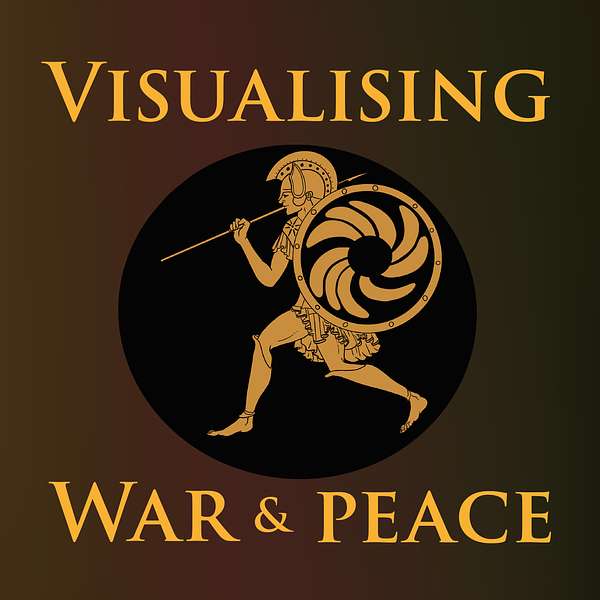
Visualising War and Peace
How do war stories work? And what do they do to us? Join University of St Andrews historian Alice König and colleagues as they explore how war and peace get presented in art, text, film and music. With the help of expert guests, they unpick conflict stories from all sorts of different periods and places. And they ask how the tales we tell and the pictures we paint of peace and war influence us as individuals and shape the societies we live in.
Visualising War and Peace
Ancient Greek warfare and its influence on modern habits of visualising war
In this episode, Alice talks to Drs Owen Rees and Roel Konijnendijk, two experts on ancient Greek warfare and its enduring influence. Owen has written about both land and sea battles in the ancient world, and his current research focuses on the experiences of soldiers: in particular, how they were prepared for war and how they transitioned back to civilian life afterwards. This has led to wider work comparing veteran experiences in ancient and modern times, and Owen has also published on trauma and PTSD in the ancient world. Roel is an expert on ancient Greek military thought, from its origins in storytelling to its codification as a 'science of warfare'. His book Classical Greek Tactics re-examines the literary evidence for Greek tactical thought during the 5th and 4th centuries BC, distinguishing between idealising representations and the more brutal, chaotic reality. He has also looked at how later military thinkers (both soldiers and scholars) have drawn on ancient models and deployed or adapted them in their own times. Owen and Roel are both regular contributors to Ancient Warfare Magazine, among other publications, and Roel recently achieved YouTube stardom with an interview rating the representation of battle tactics in films and TV.
In the podcast, we discuss the myth-making around different aspects of ancient Greek warfare, and particularly the Greek elite's interest in narrating pitched battles involving tightly-packed hoplite troops. While naval encounters, ambushes and other kinds of engagement got more summary treatment, pitched battles became a literary trope or set-piece of Greek history writing, generating clichés about Greek warfare that did not reflect the much more complex, messier reality.
We also touch on military training, and debunk the idea that Sparta's system was as focused or thorough as is often supposed. Owen discusses the social conditioning - via storytelling and commemoration practices - that prepared Athenian soldiers to fight. And Roel outlines the tensions between Homeric military ideals (of risk-taking and self-sacrifice) and how Greek generals really needed their soldiers to behave.
As the conversation goes on, we look at the ways in which generals during the 18th century turned to ancient Greek models to shape their own military practice, reviving or perpetuating the emphasis on decisive pitched battles as the only way to win a war. We also discuss how narratives and images of ancient Greek warfare have found their way into popular culture, in particular through art, film and gaming. And we reflect on the 'safe distance' which the ancient world can offer as place to explore modern experiences of conflict - whether as a soldier/veteran or civilian. As Owen and Roel explain, the storytelling that has been done about ancient Greek warfare from antiquity to today continues to shape how we visualise many aspects of war, both positively and negatively.
We hope you enjoy the episode!
For a version of our podcast with close captions, please use this link. For more information about individuals and their projects, please have a look on the University of St Andrews Visualising War website.
Music composed by Jonathan Young
Sound mixing by Zofia Guertin